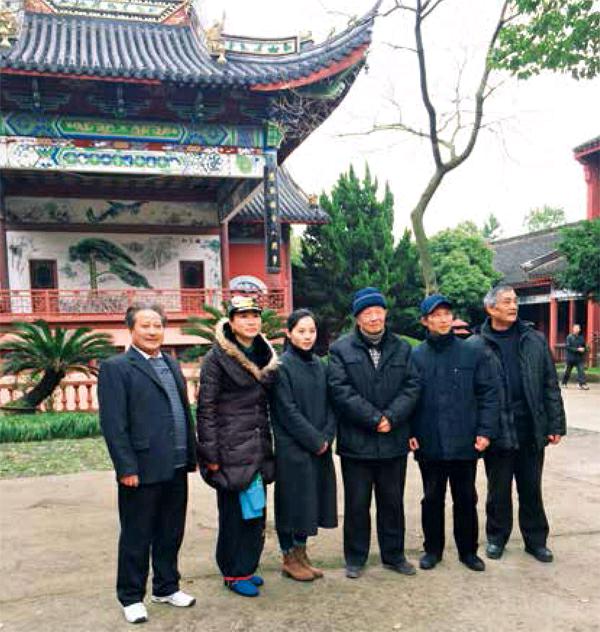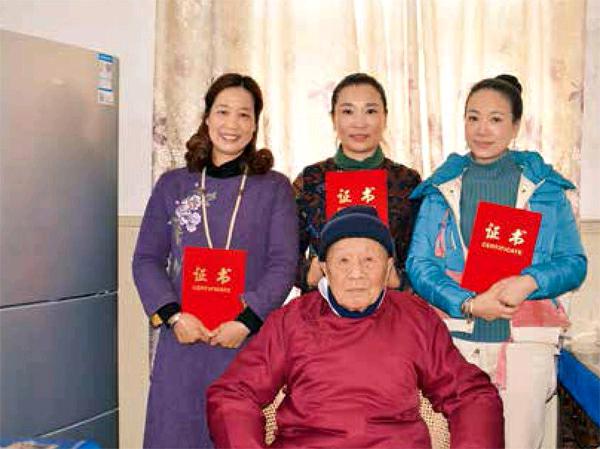又响起久违的海盐腔
文俊
悦耳动听的音乐、华丽精美的服饰、深情委婉的唱腔、丝丝入扣的表演……海盐县博物馆海盐腔展示馆窄小的舞台上,一出《南西厢记·堂前巧辩》,让笔者观赏到了明代四大声腔之首海盐腔的独特魅力。
海盐腔是一门古老的戏曲唱腔,因形成于浙江海盐而得名。由于历史原因,300多年前,海盐腔逐渐失传。
“走到今天真的不容易”

“我是2012年3月调入县文联的。那时海盐腔艺术团成立不久,没有一分钱的活动经费,演出服装是演员自己掏钱买的,化妆品是家境好的演员赞助的,连排练、演出时的盒饭,也是大伙一起凑钱买的,走到今天真的不容易……”说到辛酸处,海盐县文联副主席周蓉晖哽咽出声。
成立于2011年10月的海盐腔艺术团,目前有演职员40人。该团是海盐县文联下属的海盐腔研究会建立的既非体制内剧团,也非民间剧团。可就是这样的剧团,精心编排了“南西厢”,于2015年10月在海盐大剧院首演。演出精彩纷呈,是海盐腔研究会、海盐腔艺术团成立以来亮相舞台的首场大戏。
周蓉晖回忆,当晚的“南西厢”演出,共十出加一个尾声,时间近两小时。演员倾情投入,乐队一丝不苟,展现了海盐腔清柔婉丽、细腻动人的特色。为这台戏,大家准备了近一年,团长周文豪还曾远赴江西广昌、湖南长沙等地,调查海盐腔的传承历史。崔莺莺的饰演者梁茜说:“演出得到这么多观众的支持,出乎我们的意料。海盐腔是宝贵的财富,我们有责任和义务好好保护它、传承它。”
“南西厢”由明代海盐剧作家崔时佩等改编,在明清盛行的海盐腔、昆山腔曲目中均有。“我们现在还只能演十二出南西厢。”周蓉晖承认,目前的演出主要在海盐周边地区,配合节庆和送戏下乡、进农村文化礼堂等活动。
“我常常被演员们只讲奉献、不计回报的精神所感动。前些年,演出没有一分钱酬劳;2014年海盐腔被列入‘浙江好腔调56个剧种之一,省里有补助,市县也有配套经费,现在能稍稍发点劳务费。”周蓉晖觉得这样的模式灵活机动,节省资源,传播力与影响力也会更大。
笔者问海盐腔艺术团有没有打算创作新剧目时,周蓉晖不容置疑地回答:“现在我们没必要推出新剧目。把原来的剧本挖掘、整理、保护好,就足够我们演出了。”事实上,过去近50年来,对海盐腔的重新发掘、整理和研究一直没有停止,剧本有近40个。
与海盐腔的不了情
说到海盐腔,不能不提两位省级非遗传承人——陶维安与周文豪。今年87岁的陶维安,长期在海盐县文化馆工作,被大家称为海盐的“老文艺”。陶维安担任海盐腔研究会副秘书长一职,承担着传承使命。

陶维安从小对戏曲十分喜爱,平时经常去看戏曲交流演出。他说,当时嘉兴地区30多个剧团,哪个剧团有哪些经典剧目,剧团中有哪几个主要演员,心里都有数。他与不少剧团的创作人员、主要演员熟悉并有联系,有时会主动向他们请教戏曲知识。
上世纪80年代,陶维安参与了《中国戏曲志》浙江卷和嘉兴市戏曲资料的收集工作,真正认识到海盐腔在中国戏曲史上的重要地位。于是,从1983年开始,陶维安在海盐县文化馆原工作人员,后在杭州师范大学人文学院研究员、浙江省民间艺术家协会副主席顾希佳的启发和帮助下,努力从“海盐骚子”(也称海盐烧纸)项目中寻找海盐腔的遗音线索。陶维安告诉笔者:“我克服种种困难,首先加强自己在戏曲专业方面的学习、研究,其次收集大量历代有关海盐腔的剧本、曲牌、资料、论文,然后分门别类进行整理、研究。海盐腔的资料,有的在专著中,有的在报刊上,有的在古籍里,目前已初步形成一个有关海盐腔的资料库。这些档案资料,包括海盐骚子、海宁皮影戏、永嘉昆腔、江西盱河高腔、湖南低牌子等涉及海盐腔遗音的曲牌、曲谱和有关海盐腔的文字史料。”
很多年来,海盐流行唱越剧,要组织人员改唱海盐腔,难度不小。组建海盐腔艺术团,今年已74岁的团长周文豪功不可没。该团演员包括公务员、医务人员、学校教员、公司职员等,周文豪既要选配曲牌,还要从咬字、发音、节奏等方面,先一字一句唱给演员听,然后手把手地耐心教唱。周文豪也兼乐手,他又指点主奏笛子、鼓板、琵琶等。2009年,一曲婉转清丽、柔美典雅的《牡丹亭·游园》折子戏面世,开启了近400年后由海盐人演出海盐腔的新篇章。
“中生代要迎头赶上”
如今,海盐腔已在海盐普遍传唱。2017年6月7日,海盐县文联编创的海盐腔节目《蚌精记之喜得河蚌》,在浙江省第八届残疾人艺术汇演之戏曲专场比赛中脱颖而出,荣获银奖。为配合汇演,海盐县文联抽调人员、策划方案,安排沈永康、徐晓萍、徐频三位老师全程辅导。海盐腔艺术团乐队为残疾演员量身录制音乐伴奏,突出残疾演员表演。
海盐腔艺术团演员队队长徐频,是浙江艺校1985届学越剧出身的,2006年周文豪要排練海盐腔折子戏《牡丹亭·游园》,找到了她。徐频“转型”“入戏”很快。“近5年来演出比较多,但也在为培养年轻演员而努力。”笔者采访时,徐频正在填写申报海盐腔嘉兴市级非遗传承人的申报书,“海盐腔唯一的两位省级传承人年事已高,我们中生代要迎头赶上”。
笔者在徐频的申报书上看到:仅2016年,她除参与海盐县各乡镇文化走亲、文艺展演活动外,还参与了海盐腔小戏《蚌精记》《赠珠办学》等折子戏的创作、排练、演出;2017年上半年,演出40多场次。在此之前的十年中,她多次参加《浙江好腔调》演出并获奖;每年参加嘉兴市组织的各类演出;2013年以来在海盐各中等学校担任海盐腔特色课老师,已有5000多人次的学生接受过她的培训,部分学生已学会小段海盐腔唱腔。endprint
徐频感到遗憾的是,海盐腔艺术团至今没有排练厅、没有演出场所。她说起来嘘唏不已:“每次排练挖空心思想办法,有时向老年大学或企业借场地,有时就在文联前面的广场上,有时甚至到演员家里去,到处打游击。”她提到,50多岁而饰演小生的祝燕华,因为赶排练,不幸遇车祸,“她这一年是没法再演出了”。
“我们的演出大都在节假日的晚上,周蓉晖老师总是到场为我们鼓劲,亲力亲为的精神感动了我们。没有她的关心、爱护,海盐腔不可能发展到如今这样喜人的地步。”徐频最担心的是,在这个大家庭里,周老师是他们的主心骨,但她即将退居二线,艺术团今后如何?种种不确定性,让大伙有点忧心忡忡。
不遗余力挖掘好苗子
“事业要发展,人才很重要。”周蓉晖感慨地说,海盐腔艺术团演员平均年龄50多岁,乐队都是70岁以上的老人。为此,他们想方设法培养年轻演员。一方面,从幼儿园老师队伍里寻找好的苗子;另一方面,海盐县有98名农村文化管理员,是土生土长的海盐人,方言不是障碍,学起来相对方便,也可以考虑从中选苗子。比如,海盐百步镇农丰村文化礼堂文化管理员徐珊妮,就是已经锁定的培养对象之一。

徐珊妮是百步镇人,毕业于湖州师院艺术设计专业,2014年7月经过招聘成为农村文化管理员。“虽然刚开始的时候对文化工作概念比较模糊,但经过一段时间的锻炼,还是蛮喜欢這份工作的。”性格开朗、喜欢唱歌跳舞的徐珊妮,深得村民喜欢,每年考评各方面成绩都很出色,被评为“优秀小能手”。“我没有学过戏曲,也没有学过表演,学习海盐腔对我来说有一定难度,但我相信功夫不负有心人,我会朝着这个方向努力的,让家乡的海盐腔再续辉煌。”为此,海盐腔的讲座、培训活动徐珊妮都尽量不错过,并且通过视频学习唱腔、身段,登台表演也赢得盛赞。
来自福建的新海盐人邹燕偶尔观赏了海盐腔的演出,就成为了海盐腔忠实的粉丝。她认为,海盐腔要想发扬光大,除了服务本地老百姓,还要走出去,走向全省甚至全国,扩大影响力;此外,要多排戏,培养新人,通过演出打磨剧目、锻炼演员,“只要走上良性循环的轨道,相信海盐腔一定会越来越好”。
(除署名外,本文照片由作者提供)
Haiyan Melody, an ancient theater singing, was born in Haiyan and named after it birthplace. It flourished for about 300 years before it declined gradually during the Qing Dynasty (1644-1911)
Local people have made efforts to revive Haiyan Melody. A Haiyan Melody troupe was founded in October 2011. The 40-member troupe under the leadership of the countys Federation of Literature and Art Circles is neither a public institution nor a private troupe. It is a group of aficionados and volunteers and it is designed to keep the ancient opera alive.
Zhou Ronghui, vice chairperson of the federation, has a lot to say about the troupe. “I came to work at the federation in March 2012, shortly after the troupe was founded. It didnt have any fund then. Actors bought their own costumes. Makeup things were provided by those who were relatively well off. Members chipped in for after-show takeaway food. The troupes survival isnt easy,” emotionally recalls Zhou.
It was not until 2014 that Haiyan Melody was recognized as one of the 56 regional operas of Zhejiang Province by the provincial government. The inscription onto the official list has brought in government subsidies and the troupes fate improved remarkably.
In the first few years, the troupe focused on bringing back the 12-act in the style of the southern operas. It was originally written by Wang Shifu (1234-1294), a prominent playwright of the Yuan Dynasty (1279-1368), for troupes that performed in the North Opera style. As the artists in the south were unable to sing the tunes and lyrics of the north, the original was rewritten to enable various operas in the south to stage the play. There were several versions of the play for regional operas across the south. The Haiyan Melody version was adapted by Cui Shipei, a playwright of the Ming Dynasty (1368-1644). The play can be seen in the operas repertoire in the Ming and the Qing (1644-1911).endprint
Zhou Ronghui remarks that there is no need to create new plays in Haiyan Melody. In fact, Haiyan has worked hard to save Haiyan Melody scripts over the past five decades. Nearly 40 plays are now in the preserved repertoire. “The plays we have sorted out and preserved are enough for us to perform for a long time to come.”
The troupe performed the 12-act in Haiyan Melody first in October 2015. It was the first big show sponsored by the Institute of Studies for Haiyan Melody and Haiyan Melody Troupe.
Tao Weian and Zhou Wenhao are the key people of the comeback of the local opera. Tao is now 87 years old. He used to work for the countys cultural center and now is the vice secretary-general of the Institute of Studies for Haiyan Melody. He grew up with a passion for regional operas. As an employee of the cultural center, he knew a lot about 30 some troupes across Jiaxing, a central city in northern Zhejiang where Haiyan County is located. He was familiar with troupes repertories and major performing artists. And he was in constant contact with playwrights and major opera artists of these troupes. In the 1980s, he worked to collect materials on regional operas in Jiaxing, for the encyclopedia entitled . As he was learning a lot about history, he became aware of the importance of Haiyan Melody in the history of Chinese operas. Thanks to his efforts, now a relatively complete data bank has been set up. The data includes melodies and tunes of some regional operas that keep some elements of Haiyan Melody. Also in the data are some papers, scripts, research reports, copies of ancient documents.
Zhou Wenhao, now 74, is the director of the troupe. The artists of the troupe are all amateurs: civil servants, doctors, teachers, white-collar workers. Zhou has trained the players as well as the musicians and inducted them into the tradition of Haiyan Melody. In 2009, Haiyan saw the first modern show of Haiyan Melody in the form of a highlight of . In 2011, the troupe came into being.
Nowadays, the performing artists are 50 years old in average, and the musicians are 70 years old in average. The troupe needs young people desperately. A project is already in action and some promising people in the county are being cultivated to be stars of the troupe. Some are really willing to carry on the graceful tradition.
Haiyan Melody Troupe has a long way to go. Since its inception in 2011, the troupe is still without a rehearse space of its own. They have rehearsed in different spaces: offices and halls at a local school for the aged and companies, the public square in town. Sometimes they rehearse at someones home. As they struggle to revive the ancient opera, the hope for the opera to survive exists.endprint

